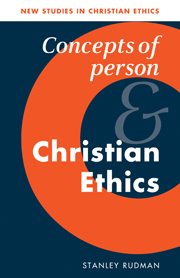Book contents
- Frontmatter
- Contents
- General editor's preface
- Acknowledgements
- List of abbreviations
- Introduction
- PART I ‘PERSON’ IN CONTEMPORARY ETHICS
- PART 2 ‘PERSON’ IN CHRISTIAN PERSPECTIVE
- PART 3 IMPLICATIONS FOR A CHRISTIAN ETHIC
- 11 A communicative ethic: Hauerwas and Habermas
- 12 A community of ethical difference: including the ‘other’
- 13 The logic of superabundance: an ethic of forgiving love
- 14 Rights and persons: the religious ground of human rights
- 15 The integrity and transformation of creation
- Conclusion
- Notes
- Select bibliography
- Index of subjects
- Index of names
13 - The logic of superabundance: an ethic of forgiving love
Published online by Cambridge University Press: 02 December 2009
- Frontmatter
- Contents
- General editor's preface
- Acknowledgements
- List of abbreviations
- Introduction
- PART I ‘PERSON’ IN CONTEMPORARY ETHICS
- PART 2 ‘PERSON’ IN CHRISTIAN PERSPECTIVE
- PART 3 IMPLICATIONS FOR A CHRISTIAN ETHIC
- 11 A communicative ethic: Hauerwas and Habermas
- 12 A community of ethical difference: including the ‘other’
- 13 The logic of superabundance: an ethic of forgiving love
- 14 Rights and persons: the religious ground of human rights
- 15 The integrity and transformation of creation
- Conclusion
- Notes
- Select bibliography
- Index of subjects
- Index of names
Summary
Closely related to the ‘love-command’, which is at the centre of a Christian ethic, confirming its concern with ‘persons in community’, is forgiveness. Christians are to forgive as they have been forgiven (Colossians iii. 12f); Jesus teaches his disciples to pray, ‘Forgive us our debts, as we have forgiven our debtors.’ On the cross he prays, ‘Father, forgive them, for they know not what they do.’ Forgiveness is characteristic of God's generous love in creation and redemption. It is also meant to characterise human relations. In this chapter, therefore, we inquire into the logic of such superabundance. We examine what forgiveness means; how it acquired a community dimension; and how this might relate to contemporary social applications.
At the point where the human and Christian stories intersect most significantly in the view of Christians – in the life and death of Jesus of Nazareth – morality is plunged into darkness and might appears to be established as victorious. At the same time, Christians point to this event as the most crucial demonstration of God's love for sinners. Healing and forgiveness and reconciliation are made possible by Christ's action, in which human categories of justice and morality are transcended. Evildoers are forgiven, and the human attack on God's representative and God's justice is transformed into a new beginning for all those who will follow in the way of love and repentance and forgiveness, and be baptised into the death and resurrection of Christ (cf. Romans vi. 3).
- Type
- Chapter
- Information
- Concepts of Person and Christian Ethics , pp. 275 - 293Publisher: Cambridge University PressPrint publication year: 1997



